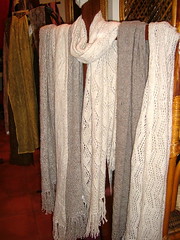Last week I heard a talk given by a representative of Panchachuli Women Weavers cooperative who have made a name for themselves by making pure pashmina products.
In 1997 funds were received to start a training program for about 150 women in the villages around Almora to teach them spinning and weaving wool and natural fibers available locally as a sustainable form of employment. In order to empower the women of this area, who were used to toiling in fields and raising cattle and being dominated by menfolk, it was necessary to chalk out a program encompassing basic and advanced training, along with infrastructure and facilities for common production centers where women could work.
Training was imparted by master weavers from the tribal communities on the Indo-Tibet border where weaving of fine wool was a tradiational occupation. Although the program was first opposed by the men of the area, eventually the women gained the support of their families and with substantial income gains brought home by the women, the whole socio-economic dynamics of families and the community turned around. The women are truly empowered. Panchaculi women and their families, moreover, have been able to swing th evotes in favor of particular elected candidates.
By the end of 2000 there were 400 women trained in various skills and the Danny Kaye and Sylvia Fine Kaye Foundation provided the funds for importing sophisticated pashmina processing machines from Scotland, for building a complex comprising seven large weaving halls, rooms for spinnng and processing of wool, stores for raw materials and finished products, administrative offices and four buses to transport women from their villages to the production center and back.
Between 2000 and 2003 another 300 women were trained and Panchaculi became a brand name in the local market, domestically and abroad.
Panchachuli procures the bulk of its wool, namely pasmina and lambswool, from the highlands of Tibet where founder Ms. Mukti Dutta and women employees go trekking over in 22,000 ft. high passes to buy wool from Tibetan nomads around Lake Manasarovar and Mt. Kailash. They are officially recognized traders by both the Indian and Chinese governments, who have allowed them access to these restricted areas.
Women also work with nettle fiber and oak silk procured locally through traditional methods of growing and processing, and have plans to work with hemp fiber.
I was particularly impressed with the beauty of the natural colors, the soft texture and the delicately intricate weaves. This photo is a display at Sasha where the Panchchuli Women Weavers are currently exhibiting their products til Dec. 24.

No comments:
Post a Comment